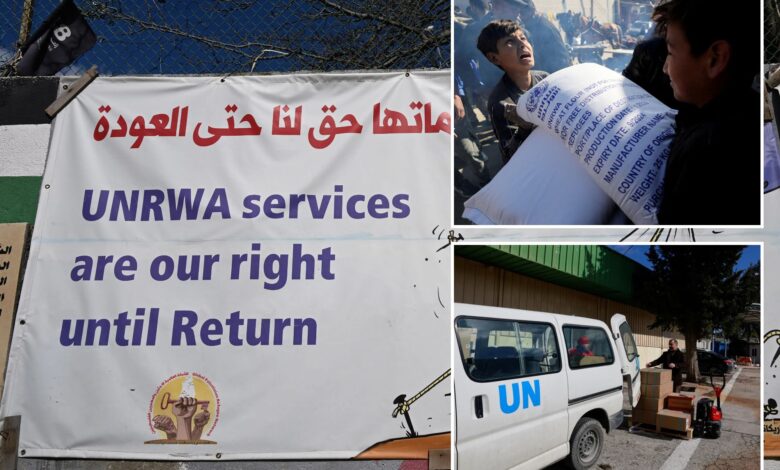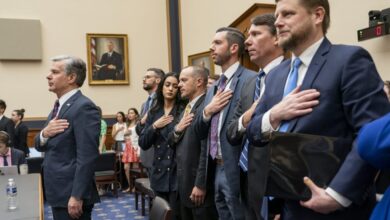Support for UNRWA condemns any prospect of Israeli-Palestinian peace

Why are Palestinian refugees treated differently than all other refugees on the planet? Why does this separate treatment practically ensure that conflict with Israel will continue long into the future?
As a result of the failed Arab war with Israel in 1948, two refugee populations emerged.
Hundreds of thousands of Jews living in Arab countries were forced to flee persecution, including deadly pogroms. Age-old Jewish communities practically vanished overnight.
Those Jews either made their way to Israel, which was struggling to build a new society while facing constant security threats and a weak economy, or found new homes elsewhere in Western countries.
It wasn’t easy for these Jewish refugees. Many lost all their personal possessions when they fled. They also left behind synagogues, cemeteries and community centers. And they had to start anew. But they looked forward, not back. With help from the Jewish world, they succeeded in forging new lives rather than wallowing in a sense of perpetual self-pity and victimization.
Palestinians were the other refugee population. Hundreds of thousands lost their homes as a result of the Arab-launched war — some encouraged to leave temporarily by Arab leaders, some fearful of being caught up in the violence, some driven out by Israeli military advances.
After the Israeli victory, the UN established the United Nations Relief and Works Agency for Palestine Refugees in the Near East (UNRWA), which became operational in 1950.
That same year, the UN created the United Nations High Commissioner for Refugees (UNHCR) to protect and resettle millions of refugees worldwide in the aftermath of World War II.
Why the need for two UN agencies and, as a result, two structures, two budgets and two staffs, when both appeared to focus on refugees affected by conflict?
Therein lies a metastasizing problem, which has directly contributed to the decades-long Israeli-Palestinian conflict, including the current Hamas-launched war that began on October 7.
While UNHCR has a mandate to help find new homes for the refugees within its jurisdiction, UNRWA explicitly does not. That means UNRWA is authorized to provide basic social services, from education to health care, but not seek resettlement for its caseload or even encourage self-sufficiency. Instead, they tend to become permanent dependents of the international community.
So, 74 years after its start, there are still UNRWA refugee camps, including, strikingly, in Palestinian-ruled areas, such as Gaza. Think about the absurdity of Palestinian refugee camps in a territory from which Israel withdrew in 2005, and which has been governed exclusively by Hamas since 2007.
But that’s not the only problem. There’s more.
UNRWA gives refugee status to descendants of the original Palestinian refugees, without any statute of limitations. That’s why a figure of hundreds of thousands in 1950, which should have declined over time, has instead ballooned to approximately six million today, almost a tenfold increase in just over 70 years.
This definition of a Palestinian refugee is without precedent anywhere else in the world. Not only does it guarantee ever-increasing numbers, but it nurtures a permanent sense of injustice and grievance.
After all, if those under UNRWA authority aren’t going to be resettled and encouraged to start new lives — and instead cling, generation after generation, to the belief that the only solution to their situation is to focus their anger on Israel in the hope of one day conquering it — what are the prospects for peaceful coexistence?
There have been countless refugees in history. Today, there are tens of millions around the world. It is tragic. Refugees have never had it easy. As the son of refugees from Europe and the husband of a refugee from Libya, I know. But to single out one refugee group for unique treatment, which, again, was the result of a war launched by five Arab armies, is unfounded and unjust.
And, finally, there’s a third UNRWA-related problem. Despite hollow-sounding UNRWA claims that it is not involved in Israeli-Palestinian politics, the truth is that it is, and big-time, as revelations about repeated UNRWA misbehavior finally make the news these days.
Even prior to the Hamas invasion on October 7, and certainly since, Israel has shown the world extensive evidence of UNRWA complicity — textbooks and classrooms that propagate incitement against Israel and Jews, facilities linked to the vast Hamas terror infrastructure, and personnel directly and indirectly in cahoots with Hamas.
Bear in mind that Hamas is listed by the United States and European Union as a foreign terrorist organization, and its explicit goal, expressed in its charter and by its spokesmen, is the annihilation of Israel.
UNRWA is not self-funded. It exists because of voluntary support from donor nations, including the U.S. and EU. Together, they provide more than 60 percent of the annual budget.
In the wake of recent confirmation that UNRWA workers were involved in the October 7th attack, it is high time for these countries to stop their generous support of UNRWA and demand, once and for all, wholesale reform and full accountability. To its credit, Germany has taken the lead, post-October 7, in freezing its own contribution. The U.S., which ended UNRWA funding in the Trump era and reinstated it in the Biden administration, is now placing a hold on support as well. And more countries, principally in Europe and also including Australia, Japan and New Zealand, are following suit as evidence of UNRWA complicity continues to emerge.
That’s welcome, if long overdue, news. It also begs the question of whether this is just a temporary response to the moment, or the start of a serious, sustained effort to overhaul, root and branch, the corruption, collusion and misguided mission of UNRWA. Unless the donor countries face this stark reality and insist on a deep dive to confront and correct the core issues, what’s the point?
One thing is for sure. Allowing the status quo with UNRWA to continue on autopilot, or with only superficial tweaks by suddenly nervous UNRWA leaders, is practically guaranteed to perpetuate the conflict — and reduce still further any prospect of enduring Israeli-Palestinian peace.
David Harris is Vice Chair of the Institute for the Study of Global Antisemitism and Policy, and former CEO of American Jewish Committee (1990-2022).




